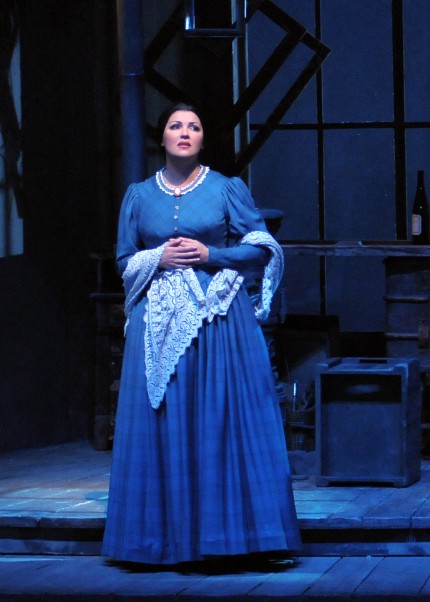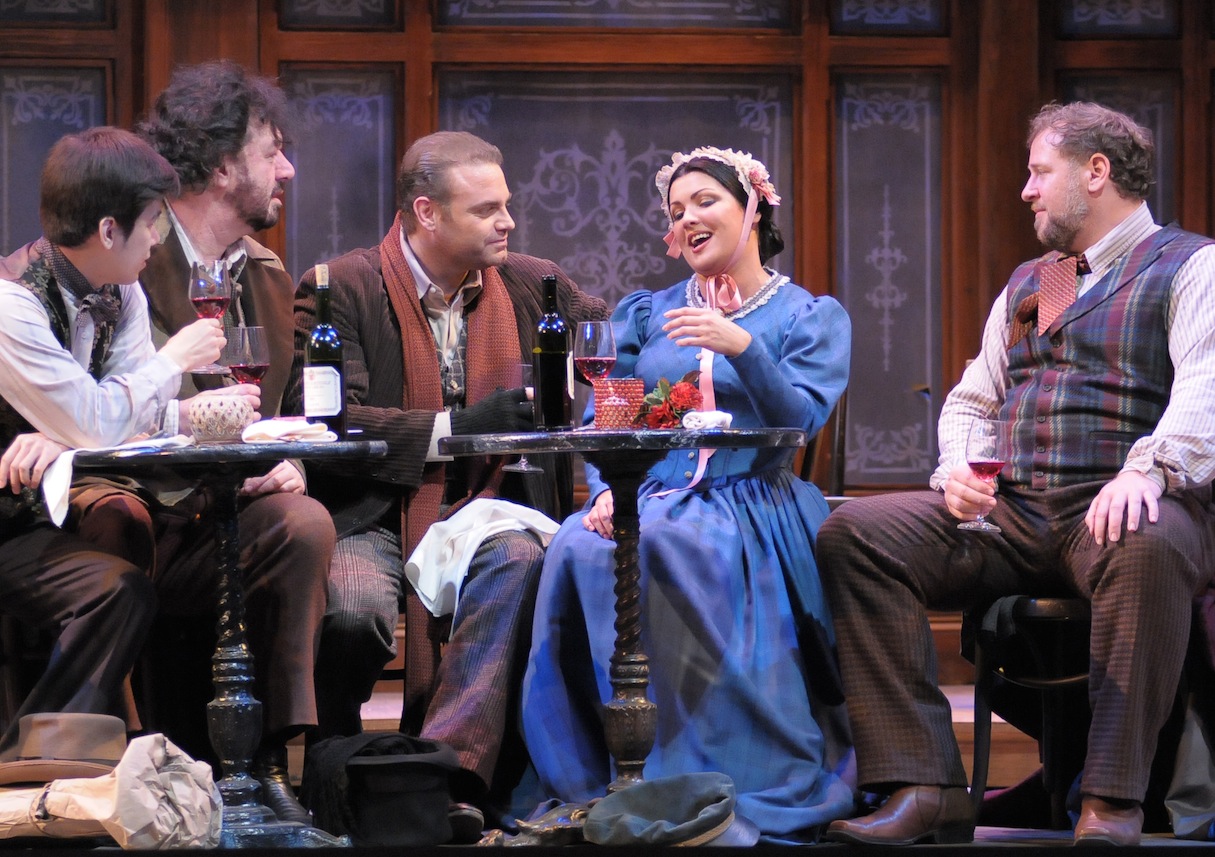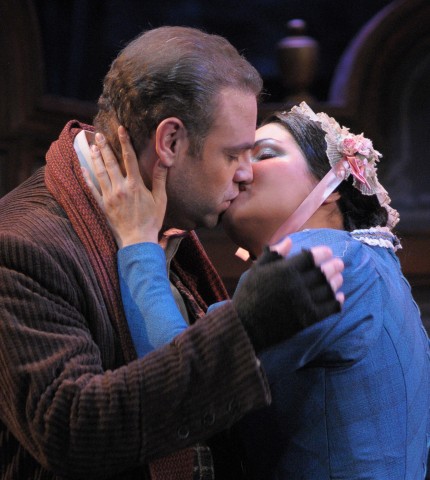Star power and soaring vocalism make second time the charm for Lyric Opera’s “La Boheme”

After the mediocre, vocally uneven La Boheme that opened in January, the Lyric Opera of Chicago got it right the second time around, boosted enormously by two starry principals who made Puccini’s romantic tear-jerker shine like new Saturday night at the Civic Opera House.
You don’t realize how much true star power has been missing on local opera stages until you experience the real thing. And with Anna Netrebko as Mimi in the current Boheme cast, which runs through March 28, Chicago is seeing the kind of gleaming vocalism, dramatic acuity, and personality-plus stage charisma that has been infrequently glimpsed in Chicago productions in recent seasons. Why in the world has it taken so long for Netrebko to make her Chicago debut?
The Russian soprano truly is the complete package—a strikingly beautiful woman possessed of a rich creamy voice and an assured and credible actress to boot. Netrebko’s luminous rendering of Mi chiamano Mimi was as intimate and affecting as it was beautifully sung, her Donde liete usci, human and expressively nuanced.
Dramatically, the soprano brought a vivid characterization to the gentle seamstress, much more rounded and acutely detailed than the usual one-note doomed waif. It was wonderfully entertaining to watch Netrebko’s enthused responses to the action around her at Cafe Momus. Yet the singer also brought jarring emotional desperation to Act 3 as she tells Marcello of Rodolfo’s jealousy. In Mimi’s final moments, Netrebko avoided the usual hand-dropping tropes, remaining completely still as she sang Mimi’s dying broken words, her hushed singing proving heart-breaking enough without the need for distracting visuals.
Though much local attention is focused on Netrebko’s Lyric Opera debut, Joseph Calleja’s Rodolfo was on an equally inspired level. (In fact, the Maltese tenor received an even more tumultuous curtain-call ovation than Netrebko opening night.)
After the shaky outing by Dimitri Pittas in the January-February cast, what a pleasure to hear the role of the poet Rodolfo sung with such ardent tone and ease of production. Calleja has a notably vibrant tenor with a quick vibrato that lends excitement to his singing (recalling the great Giacomo Lauri-Volpi). His Che gelida manina was real opera story-telling, done with an easy legato and clarion high C. (Calleja also inserted the spurious top C in O soave fanciulla but with his kind of ringing high notes, who’s complaining?)
Calleja was just as superb and insightful dramatically as his famous costar, entering fully into the high-jinks with his fellow Bohemians, and bringing understated acting and a credible human dimension to Rodolfo, even praying fervently as Mimi lies on her deathbed.
Netrebko and Calleja have worked together many times, including in La Boheme, and the two singers have a natural chemistry together on stage that makes it possible to believe Mimi and Rodolfo really do fall in love instantaneously. Let’s have both of these artists back as soon as possible, preferably together.
Lucas Meachem remains a terrific Marcello, vocally robust and volatile in personality. As Musetta, Elizabeth Futral characterizes well, though her light soprano still sounds stretched in this role. Andrea Silvestrelli as Colline and Joseph Lim as Schaunard round out the Bohemians effectively.
Louisa Muller’s stage direction is a mixed bag, which makes it an improvement over the ragged effort in January. Act 1 is still busy without being funny and Cafe Momus too static and awkward. The latter acts were more credibly staged and blocked, though it’s likely Netrebko and Calleja bodily lifted the production’s weaker moments with their own considerable vocal and dramatic skills.
Conductor Emmanuel Villaume has picked up the pace from some of the poky tempos he employed in the first-cast opener. With his attentive and sensitive direction, Puccini’s lyrical music now flows in more idiomatic fashion, and the Lyric Opera Orchestra was on top of their game Saturday, putting across this melodic score with warmth and vitality.
La Boheme runs through March 28. lyricopera.org; 312-332-2244.

Posted in Performances



Posted Mar 10, 2013 at 6:53 am by suzelle Smith
I attended the second opening of La Boheme last night at the Lyric Opera. The principal stars, Netrebko and Calleja were thrilling and worth the trip from Los Angeles to experience. But, the music as conducted by Emmanuel Villaume, was perfection. Everything poignant about Puccini’s score, Villaume succeeded in communicating in a love affair with both the performers and the audience. The plot of La Boheme is of course silly and detached (including the missing act would help the disjointed plot line). But who cares; the music both instrumental and vocal is what matters. And Villuame demanded the best from everyone on the stage and got it. No one in the opera house was untouched or ultimately unloved! Few dry eyes, despite efforts not to be seduced by the predictable sentimentality. But the music — just irresistible. Not matter how many times you have seen La Boheme.
Posted Mar 19, 2013 at 10:39 pm by Peter-D-G
The performance on March 18 was fabulous – something the Lyric will have a hard time topping – ever. Netrebko was a pleasure to listen to. But to my ears Calleja’s over-the-top vibrato was unbearably painful. I was ready for ear plugs during his solos. I hope this is a passing phase – like period instruments. Vibrato adds to the quality of the sound when it is NOT demanding your attention, but when it’s so intense that it dominates all else then it’s too much – it is just wrong.